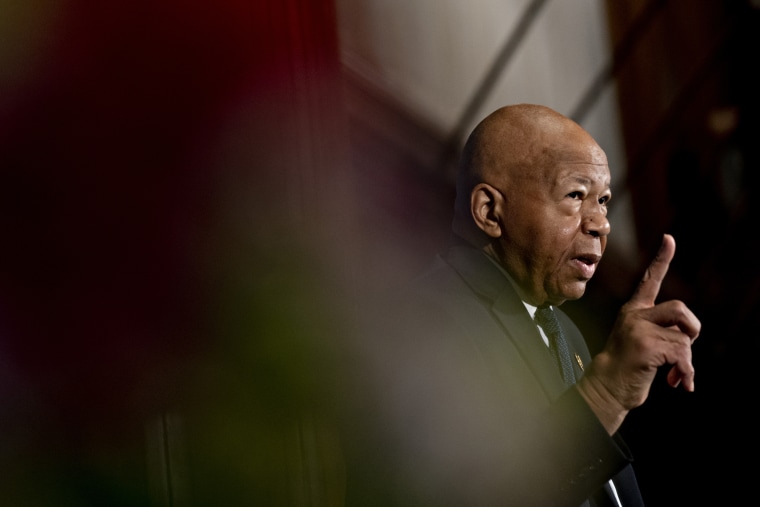I’ll never forget one of the first times Elijah Cummings spoke to me. It was in early 2011, Cummings was the ranking member on the House Oversight Committee and I was on the verge of being fired from my job as the spokesperson for the committee’s Republicans. The Maryland Democrat, who died on Thursday, said to me, “don’t worry, you’ll be back.” Almost six months to the day, when I was indeed brought back to the committee as a senior advisor, Cummings came over and shook my hand. “Good for you," he whispered in my ear. "You always were fighter.”
It’s fitting that Cummings’ final chapter had him at the center of the important political fight we find ourselves in today.
It’s fitting that Cummings’ final chapter had him at the center of the important political fight we find ourselves in today. It is a fight I believe Cummings truly believed would decide the future of our Republic. Despite health challenges, Cummings never took a step back, never wavered in his conviction. He believed that standing up for the constitution was worth the personal cost, even if it monopolized the last days and weeks of his life.
Some eight years after I left my job in the House, I found myself again in Cummings’ office on Capitol Hill. The Democrats had just won back the majority in the House and Cummings was poised to be elevated to the chairmanship of the House Oversight Committee. So much had changed in my life since the last time I had seen or spoken to Cummings; most notably, I was now a Democrat. But there wasn’t any particular purpose or agenda for this meeting.
I remember Cummings entering the room with a little smirk. “Why did you want to see me?” he asked — a fair question. I told him I just wanted to shake his hand and tell him to his face how much I respected him. I wanted him to know how much his words of encouragement all those years ago had meant to me. And I told him America was fortunate to have a person like him leading the House Oversight Committee during these uncertain and divisive times.
I have watched in recent years how Republicans on the panel abandoned the principles of oversight they once championed. It is this hypocrisy in fact that helped motivate me to leave the GOP. Cummings told me he understood how hard it must have been to make a change like that, especially in a town like Washington D.C. He told me stay true to my principles and never stop fighting.
I told him America was fortunate to have a person like him leading the House Oversight Committee during these uncertain and divisive times.
About five years ago, friends and colleagues gathered in the hearing room of the House Oversight Committee to celebrate the unveiling of former chairman Darrell Issa‘s official portrait. Back then, the hearing room was adorned with portraits of all the past chairs — Democrat and Republican alike. Joining the festivities was Cummings. Gracious and jovial, he accepted Issa’s invitation to address the room, joking that his “momma” had instructed him to be nice since Issa “had gone and made you famous.”
In retrospect, Cummings' time on the committee forged him into one of Congress’ most dedicated defenders of legislative oversight authority. Perhaps the most infamous moment of Issa’s tenure as chairman involved him cutting off Cummings’ microphone during a hearing related to the panel’s investigation into the IRS. Issa later apologized to Cummings — and Cummings accepted that apology — but the viral episode only enhanced Cummings’ oversight credentials.
As Trump replaced Obama in the White House, Cummings continued to serve as a visible spokesperson for checks and balances, this time holding Rep. Trey Gowdy’s feet to the fire. In what would serve as a prelude to the current impeachment battle, Cummings suggested over 50 motions to subpoena the Trump administration, which the Republicans all blocked. It was a move that forced the GOP to own its oversight hypocrisy on the record.
But what was so unique about Cummings was that while publicly he played the role of our chief antagonist, behind the scenes he was almost universally respected and liked. Issa and Cummings had genuine respect for one another. In fact, Issa’s staff lived in perpetual fear that our boss's genuine affection for Cummings could result in him being talked out of issuing a subpoena or launching an investigation.
At the same time, Cummings' reputation for fairness and professionalism made Trump’s personal and racist attacks on Cummings in July all the more jarring and reprehensible. Cummings was someone of unimpeachable integrity who was unfailingly fair. He treated everyone with respect, especially those who disagreed with him. Circumstances and events seemed to put him at the center of things, but he was not someone who sought out the spotlight — a rare quality in politics. People like Trump, who callously tried to tear him down, only served to elevate him and his contemporary calling to protect the legislative branch of government.
Ultimately, Elijah Cummings will be remembered as a hero in our American story. He was an exemplary public servant and a tireless advocate for the voiceless. I’ve come to think of Cummings almost as the conscience of Congress. In looking at the institution he so faithfully served to the very end, lawmakers should consider renaming one of the congressional office buildings after Cummings. It would stand as a permanent reminder of his legacy, and of the principles that he knew were always worth fighting for.


